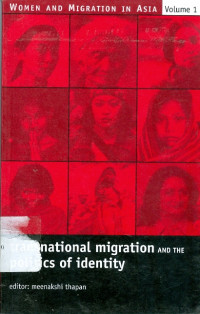
Text
Transnational migration and the politics of identity
Transnationalism can be defined as a social process whereby migrants operate in social fields that transgress geographic, political and cultural borders. As a conceptual tool, it offers an alternative framework to the erlier assimilation model and has transformed our understanding of the process of incorporation of the immigrant. It allows us to view the immigrant as one who straddles two worlds, the past and the present, through the attachment and commitment to two or more nations at the same time. This volume, the first in the series entitled Women and Migration in Asia, focuses on Asian women`s experience of immigration and the impact this has on their identity in the context of transnational migration. It highlights the gendered dimension of migration, the differential experience of men and women, and the consequences of this for women. It also examines the complexities that women encounter in the process of migration, emphasizing both the constraints that women experience, and the strategies they deploy in making life in the new country more bearable.
The volume draws attention to the fluid nature of a migrant woman`s identity while also pointing out that this fluidity and her identity are regulated to a certain extent by the state and various social institutions. Moreover, it examines the manner in which she negotiates with these larger institutions and structures—such as the state, employers, the community and welfare institutions—and how these engagements help in defining and restructuring her identity in different ways.
Availability
| KP.VII.2.000039 | KP VII.2 THA t | My Library | Available |
Detail Information
- Series Title
-
-
- Call Number
-
KP VII.2 THA t
- Publisher
- Indianapolis : SAGE Publications., 2005
- Collation
-
320p. ; 22cm.
- Language
-
English
- ISBN/ISSN
-
0761934251
- Classification
-
KP VII.2
- Content Type
-
-
- Media Type
-
-
- Carrier Type
-
-
- Edition
-
-
- Subject(s)
- Specific Detail Info
-
-
- Statement of Responsibility
-
-
Other version/related
No other version available
File Attachment
Comments
You must be logged in to post a comment
 Computer Science, Information & General Works
Computer Science, Information & General Works  Philosophy & Psychology
Philosophy & Psychology  Religion
Religion  Social Sciences
Social Sciences  Language
Language  Pure Science
Pure Science  Applied Sciences
Applied Sciences  Art & Recreation
Art & Recreation  Literature
Literature  History & Geography
History & Geography